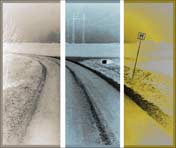MEDIA, WAR AND PEACE
Virtually all of us must rely on media to build our view of the world. The mass media convey images from around the world, and when put together they become world images in our minds.The question is: How reliable are the media? What are we told and what not? How? Are all parties to a conflict given fair attention? What are the words and the accompanying images conveying ex- and implicitly?
Why is the conflict perspective so often on individual leaders and not on processes, history, structures and cultures - leading to the mistaken assumption that if only they can be deposed, or killed, everything will be much better?

And why is there such a conspicuous fascination throughout our media with violence and war and virtually no research and coverage of the underlying conflicts?
It's not that 'negative' news should not be there; it's part of the reality of course. But what's missing to quite a large extent is any serious coverage of facts, events and trends that make us feel more hopeful or encourage us to take positive action.
After all, this 'positive' news is also a manifested aspect of the reality.
TFF's pro-peace approach compels us to look for alternative ways of reporting about what happens in our common world.
Mass media ought to tell us more about actual and possible peaceful ways to handle conflicts, rather than letting military expertise propound, more or less without counter-arguments, in favour of military solutions.
One alternative approach is sometimes called peace journalism.
Peace journalism is not the greatest of labels - unless you're familiar with the correct definition of the term - because it's not implying that media shall advocate only for peace and never for war.
Journalism should contribute to neither, one may argue. It should not be in favour of violent methods of conducting politics. Unfortunately, that is the dominant bias.
It is, therefore, reasonable to not only warn the world about a "Military-Industrial Complex" (MIC) as president Dwight D. Eisenhower did in his farewell speech in 1961.
We must also warn the world about the out-of-democratic control MIMAC - the "Military-Industrial-Media-Academic" Complex - which exists in the great majority of the world's countries and is, today, the single largest structure of vested interests that threatens humanity's future.
In other words, the mainstream media function, more often than not, as participants in militarism rather than as a neutral observer/reporter of it or an opponent to it.
Peace journalism, in contrast, is professional journalism that seeks to cover not only violence (like war reporting does) but also the underlying conflicts and the existing forces for peace.
It does this by digging deeper into underlying, less conspicuous aspects: Who are the far majority of people who work for normal human relations in any war zone? Who are the peace 'ladies' and not just the war 'lords'?
Why is civil society, the people who never touched a gun, not represented at negotiation tables - why is all the limelight on those who've been to the killing fields?
Moreover, in peace journalism the focus is not only on the immediate "theatre" of war but also on the much larger framework and the oftentimes less visible external factors such as parties with vested interests that are indirectly involved in the conflict.
In this way, peace journalism puts the conflict, not the violence, in focus by providing a larger perspective in time and space rather than simply looking at who is right and wrong and who should be punished and who should have our sympathy.
Peace journalism reports on the types of solutions the various parties see as desirable and how these could be achieved with less violence and it focuses on civilian, national and international mechanisms that could be employed in conflict-management before any resort to violence - which should always be the last resort.

In short, peace journalism is about finding new angles on a conflict and highlighting issues that mainstream media does not. It's about being constructively different; cherishing diversity and avoiding the homogeneity that characterizes mainstream newspapers' foreign policy page: they all look the same, don't they?
TFF is aligned with the principles of peace journalism.
We would argue that media ought to focus much more on conflicts, cultures and structures established throughout history and much less on individuals or, as is oftentimes the case, on demonizing one individual or party to a conflict.
It would vastly increase general conflict understanding, or diagnosis - and, thus, prognosis and resolution - if the emphasis was put on the fears and interests and not merely on the parties' stated, noble (but often self-serving) motives.

We at TFF have been fascinated by the development of social media in a broad sense. Thanks to the Internet and millions of individuals active in social media, we can now know things and get perspectives on news and global trends that mainstream media wouldn't dream of bringing us.
Surely, the social media has already helped bring about huge socio-political changes; they enable us to be both knowledgeable and politically incorrect!
The foundation got on the main social media in 2007.
Everything posted on our homepage and blog was also posted there and that was, in those ten years, where the debate took place. And we shall continue or outreach there as before.
However, with the ever stronger influence of four things, we feel we need a new forum too that is independent of social media and can take the debate also outside social media.
That's what The Transnational which we launched in 2018 is all about.
The four things are the documented fake news/propaganda, omitted or hidden news, the fact that both Facebook, Google Search and Twitter exercise censorship on behalf of political and corporate interests and, fourth, that net neutrality has been undermined by the US Federal Communications Commission (in late 2017).
TFF has been targetted already by these mechanisms during 2017. The fake/propaganda, omissions and censorship are trends likely to intensify with the relative decline of the West vis-a-vis the Rest.
The Transnational shall be seen in this perspective too.



 Get Free Email Updates
Get Free Email Updates Support this site
Support this site Feedback
Feedback About this website
About this website